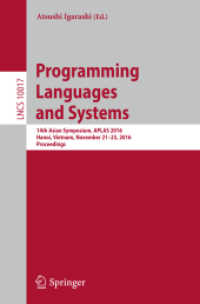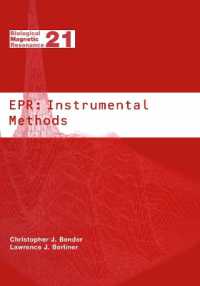- ホーム
- > 洋書
- > 英文書
- > Computer / General
Full Description
Learn the fundamentals of PL/PGSQL, the programming language of PostgreSQL which is most robust Open Source Relational Database. This book provides practical insights into developing database code objects such as functions and procedures, with a focus on effectively handling strings, numbers, and arrays to achieve desired outcomes, and transaction management.
The unique approach to handling Triggers in PostgreSQL ensures that both functionality and performance are maintained without compromise. You'll gain proficiency in writing inline/anonymous server-side code within the limitations, along with learning essential debugging and profiling techniques. Additionally, the book delves into statistical analysis of PL/PGSQL code and offers valuable knowledge on managing exceptions while writing code blocks.
Finally, you'll explore the installation and configuration of extensions to enhance the performance of stored procedures and functions.
What You'll Learn
Understand the PL/PGSQL concepts
Learn to debug, profile, and optimize PL/PGSQL code
Study linting PL/PGSQL code
Review transaction management within PL/PGSQL code
Work with developer friendly features like operators, casts, and aggregators
Who Is This Book For
App developers, database migration consultants, and database administrators.
Contents
Chapter 1: Introduction to PL/pgSQL. - Chapter 2: PL/pgSQL Variables. - Chapter 3: PL/pgSQL Data Types. - Chapter 4: Dealing with Strings, Numbers, and Arrays. - Chapter 5: Control Statements. - Chapter 6: Handling Arrays. - Chapter 7: Handling JSON. - Chapter 8: Cursors. - Chapter 9: Custom Operators. - Chapter 10: Custom Casting. - Chapter 11: Dynamic SQL. - Chapter 12: Building Functions and Procedures. - Chapter 13: Returning Values and Parameters. - Chapter 14: Handling Exceptions. - Chapter 15: Triggers. - Chapter 16: Transaction management. - Chapter 17: Aggregators. - Chapter 18: Listen and Notify. - Chapter: 19: PL/pgSQL Essential Extensions.








